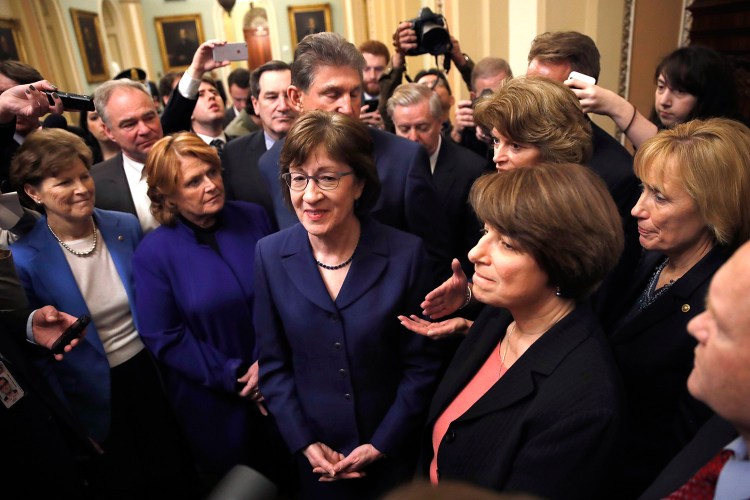Maine’s two U.S. senators were once again at the center of negotiations to end a federal government shutdown.
Republican Sen. Susan Collins of Maine and Democratic Sen. Joe Manchin of West Virginia led a group of moderates from both parties that began meeting Friday, hours before funding for most federal offices lapsed. Gathering in Collins’ Washington office, the group that included Sen. Angus King of Maine grew from 17 to 25 senators by Monday as they pressured the chamber’s Republican and Democratic leaders to accept a compromise to reopen government offices in exchange for commitments on allowing debate and votes on controversial immigration policy.
The Senate voted 81-18 Monday afternoon to end the deadlock. The Republican-controlled House followed suit soon after and President Trump signed the budget resolution to end the government shutdown a little before 9 p.m.
Speaking after the initial Senate vote, Collins said Senate Majority Leader Mitch McConnell, R-Ky., and Minority Leader Chuck Schumer, D-N.Y., listened and showed “some flexibility after starting out being pretty dug-in.” Manchin and Collins also led the so-called “Common Sense Coalition” that worked to end the 16-day government shutdown in October 2013.
“Ultimately, it was the decisions made by Mitch McConnell and Chuck Schumer that brought us to this point,” Collins said during a news conference with Manchin. “But I believe that our group, by giving them specific ideas for how to move forward, and because of the size and bipartisan nature of our group, played a very instrumental role in breaking the impasse.”
King, an independent who caucuses with the Democrats, participated in the bipartisan discussions over the weekend and was pleased with the progress.
“I think we made a significant contribution,” said King, who was also part of the “Common Sense Coalition” during the 2013 shutdown. “I’m certainly not going to sit here and say we solved it. But I think that absent these efforts, we might have been sitting here for a week or more.”
Under the deal struck between the two leaders, Democrats agreed to extend government funding through Feb. 8. McConnell, in return, will allow an immigration vote after Feb. 8 if senators cannot strike a deal before then to address the so-called “Dreamers” – immigrants brought to the U.S. illegally as children.
The continuing resolution also will reauthorize for six years the Children’s Health Insurance Program, also known as CHIP. Collins said she was particularly pleased with the reauthorization “in order to not disrupt or jeopardize health insurance for 9 million low-income children, including nearly 23,000 in the state of Maine.”
Some liberals and immigration activists quickly condemned the Senate agreement, accusing Schumer and Democratic supporters of caving to Republicans and President Trump. They questioned McConnell’s trustworthiness and pointed out the Senate deal does not guarantee the Republican-controlled House or the president will agree to revive the Deferred Action for Childhood Arrivals, or DACA, program that allowed so-called Dreamers to obtain work permits and avoid deportation. There are roughly 800,000 DACA recipients now at risk of deportation if the Trump administration follows through with its pledge to end the program in March, absent congressional action.

Sen. Susan Collins, R-Maine, holds a colorfully beaded Native American “talking stick” in her office on Capitol Hill on Monday. Collins employed the stick, given to her by Sen. Heidi Heitkamp, D-N.D., to help bring order out of the chaos as senators gathered in her office to work on a compromise.
Progressives were quick to point out on social media that McConnell also had promised Collins that Congress would vote before the end of 2017 on measures to restore premium reduction payments and mitigate the effects of repealing the individual mandate on the Affordable Care Act. McConnell made the pledge as part of his efforts to win Collins’ crucial support for Republicans’ tax reform bill. But Congress has yet to act on those issues.
Asked about Democratic skepticism of McConnell, especially given his unfulfilled promises on the Affordable Care Act, Collins said she was still confident those fixes would be made and that discussions were continuing “in a pretty good way.”
“There’s no doubt that the deadline slipped and that was very disappointing to me last December, but what’s important is getting the policy across the finish line,” Collins said. “And, in fact, the repeal of the individual mandate does not go into effect until 2019, so we do have some time and I’ve had two excellent conversations with the Speaker (Paul Ryan) personally, and he actually is quite enthusiastic about the Collins-Nelson High Risk Pool Bill.”
Speaking to Maine reporters during a conference call, King said there was bipartisan consensus among the Common Sense Coalition members that the Senate couldn’t realistically “bind” the hands of the House on DACA as part of the budget negotiations. But there appears to be strong, bipartisan support in the Senate for continuing the DACA program. And King speculated that if the Senate can pass a DACA bill with a two-thirds majority – and the president responds positively – that could put pressure on House Republicans to support the bill.
As for McConnell’s pledge to allow immigration debate, King said “we’ll see in the next few weeks,” but was willing to take the Republican leader at his word.
“Leader McConnell spoke to the nation from his desk (on the Senate floor) and said this was going to happen,” King said. “I think he has a major stake in this process. His credibility is on the line and he is going to have to make it happen.”
King hopes the negotiations over the funding bill and immigration will lead to the “emergence of a strong middle” in the Senate that will continue bipartisan discussions beyond the context of a government shutdown.
Collins, meanwhile, said there is still work to do.
“There are many other issues that we need to deal with, including budget caps and the urgent need for additional funding for national defense and the opioid crisis,” Collins said in a statement. “The successful bipartisan effort that led to the reopening of the government today, however, is a significant and promising step forward.”
Kevin Miller can be contacted at 791-6312 or at:
Twitter: KevinMillerPPH
Send questions/comments to the editors.




